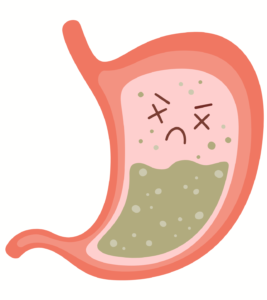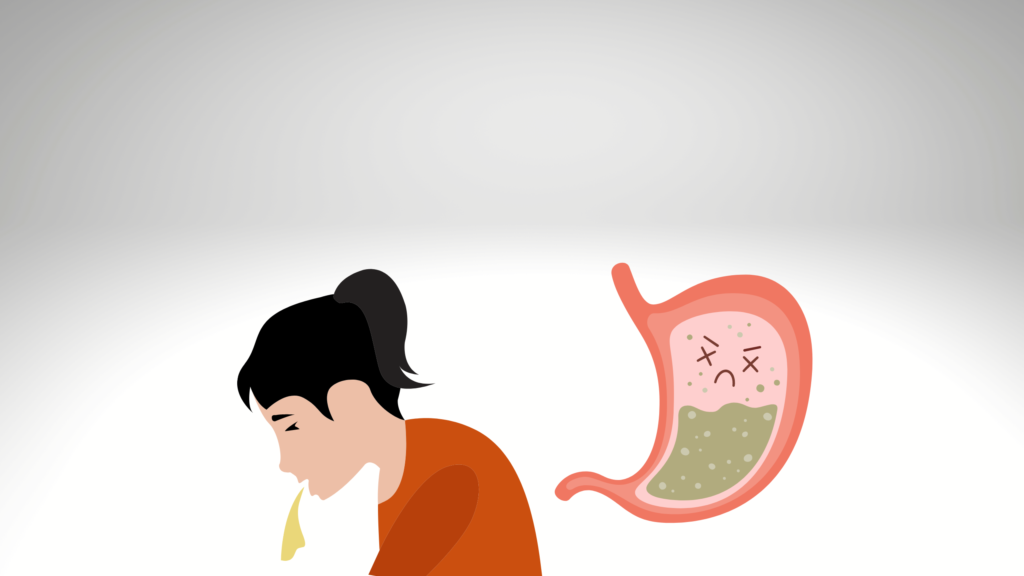We have reviewed heartburn and all of its unpleasantness, which can sometimes happen with the GLP-1 RAs such as Ozempic, Saxenda, and Trulicity. You can read that one here.
Today, we are going to dive into an equally as icky side effect, Nausea, and how we manage it.
What is nausea?
 Now I don’t know about you but nausea is one of my least favorite bodily sensations to feel. I do love WebMDs definition – “Nausea is an uneasiness of the stomach that often comes before vomiting and vomiting is the forcible voluntary or involuntary emptying of the stomach contents through the mouth. I do love direct and to-the-point descriptions.”
Now I don’t know about you but nausea is one of my least favorite bodily sensations to feel. I do love WebMDs definition – “Nausea is an uneasiness of the stomach that often comes before vomiting and vomiting is the forcible voluntary or involuntary emptying of the stomach contents through the mouth. I do love direct and to-the-point descriptions.”
Nonetheless, I am sure every single one of us has experienced nausea, and/or vomiting on many occasions over the course of our lives. The problem with nausea is it is like fatigue, it is nondescript and could have countless causes, everything from early pregnancy to a viral infection, to doing too many keg stands at a Frat house party or the smell of your dog’s tootsie rolls left in the backyard. In fact, I feel a little vomit in the back of my throat just thinking about the above. Anyways, nausea is also a common side effect of the GLP-1 RAs medications used for diabetes and obesity.
Before I get too far along here, I just need to get a legal aside out of the way. If you are experiencing nausea and you are unable to determine the reason or it is happening consistently, please follow up with your doctor. As I said, it is a non-descript symptom that could be due to something benign or serious. Kapeesh?
Now, what about nausea with Ozempic, Saxenda, and Trulicity?
 Well, this again is a side effect that often occurs when starting these medications but eventually subsides as your body becomes used to the medication. The cause is thought to be two-fold. Not only due to how slowing or how quickly food goes from your stomach to your small intestine, but we also believe there may be a neurogenic origin or that another cause arises from the GLP-1 hormone acting somewhere in the nervous system. Either way, it is common and can be quite a bothersome side effect. For some people, this nausea can lead to vomiting.
Well, this again is a side effect that often occurs when starting these medications but eventually subsides as your body becomes used to the medication. The cause is thought to be two-fold. Not only due to how slowing or how quickly food goes from your stomach to your small intestine, but we also believe there may be a neurogenic origin or that another cause arises from the GLP-1 hormone acting somewhere in the nervous system. Either way, it is common and can be quite a bothersome side effect. For some people, this nausea can lead to vomiting.
Usually, my patients have reported that their nausea occurs after eating a meal. In particular, if they overeat or try to eat their regular portion and the food of course is not moving along nearly as quickly through the GI tract. If something cannot go down it is going to try to come back up – hence a feeling of nausea and sometimes vomiting.
However, nausea can also occur outside of mealtimes. It might be sporadic occurring randomly throughout your day and not in conjunction with a meal. Again, some people might find nausea significant enough to cause vomiting. Now you might be thinking, that sounds horrible, and yes, for the rare poor souls it can be. For most people though, these side effects are mild and tolerable.
Now many of you will likely make the comment that it is by causing nausea that these medications lead to weight-loss. While nausea can make it challenging to eat properly it is not the mechanism by which these drugs support weight-loss. The weight-loss effects are all happening in the brain and the nausea is just a side effect that will go away for 99% of people. It is also important that you are eating enough calories throughout the day. Your body still needs nutrients in order to function, and if you are too nauseated to eat or if every time you do it results in you vomiting, these medications may not be for you! That is OK. There are other agents available that can support your weight management efforts. You deserve to feel good and not be miserable from nausea – the weight-loss is not worth it! Ok? Cool.
So how do we manage or make nausea more tolerable if we do experience it?
The recommendations are quite similar to those that I provided in my blog on heartburn management:
1) Eat smaller and more frequent meals throughout the day.
2) Focus on bland foods. Remember what your mom made you when you had a GI bug? Crackers and soup? Milk toast? Yeah, you can’t go wrong with those.
3) Slow down when you eat. Take your time and listen to your body. When you are satisfied, stop eating. Don’t fight it or try to push through; I assure you, you will regret it.
4) Eat without distractions! This ties into the above – eat your meal sitting down with no TV, cellphone, or book. Just relax and enjoy every savory morsel of your meal.
5) Avoid foods or situations that have caused you nausea in the past. Have your partner clean up the dog poop or change some diapers. Whatever was bad pre-medication will likely be magnified while on medication.

Is there anything else I can do or take?
Finally, we can look at using other medications in the short term in order to manage nausea caused by the GLP-1 RAs. Not the ideal as there are other risks and concerns, but certainly something that can be discussed with your care team!
Gravol or ginger can certainly be considered. There are also more powerful prescription-based anti-nausea medications, however, there is little to no evidence of their use in managing nausea due to the GLP-1 RAs. In my anecdotal experience it might provide some benefit, however, it is no miracle. Again, if your side effects are severe enough, you might just have to stop the medication.
——–
So that is nausea! Hopefully this has been helpful. Stay tuned for when I cover constipation and diarrhea! (Tip: make sure you don’t miss my next blog and vlog by signing up for my weekly newsletter!)
Until next time always remember small tweaks lead to massive peaks.






